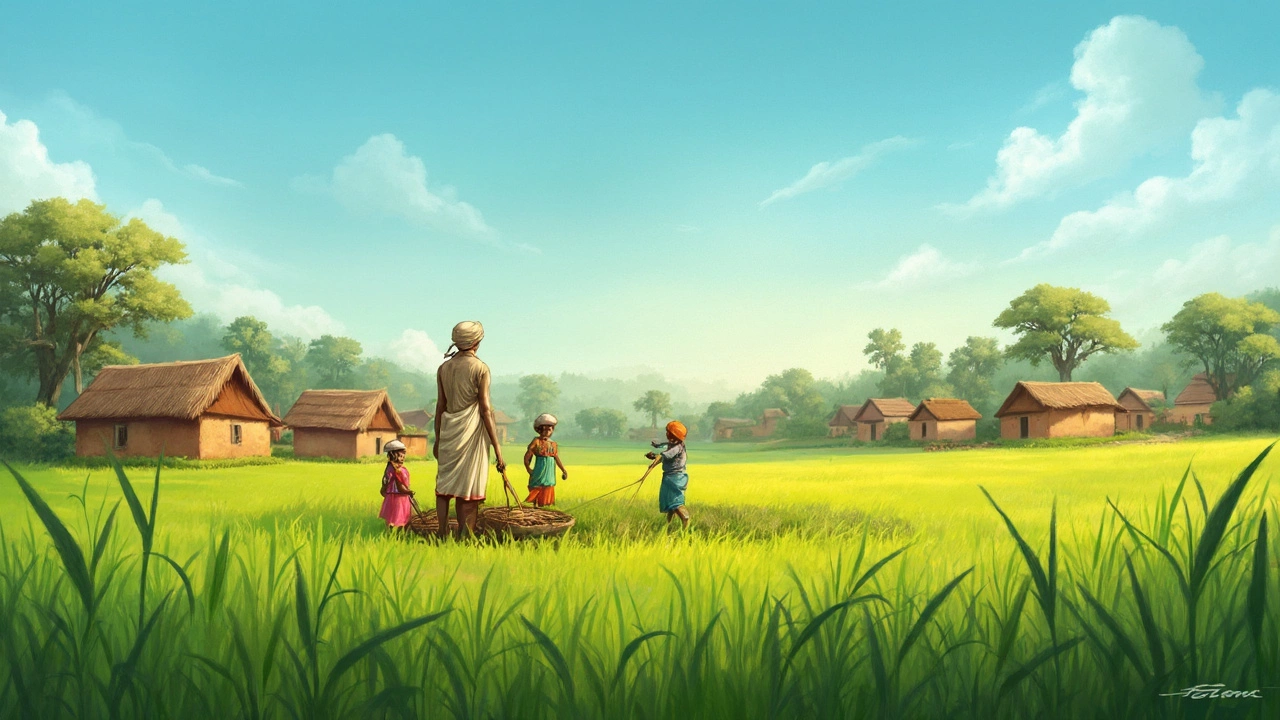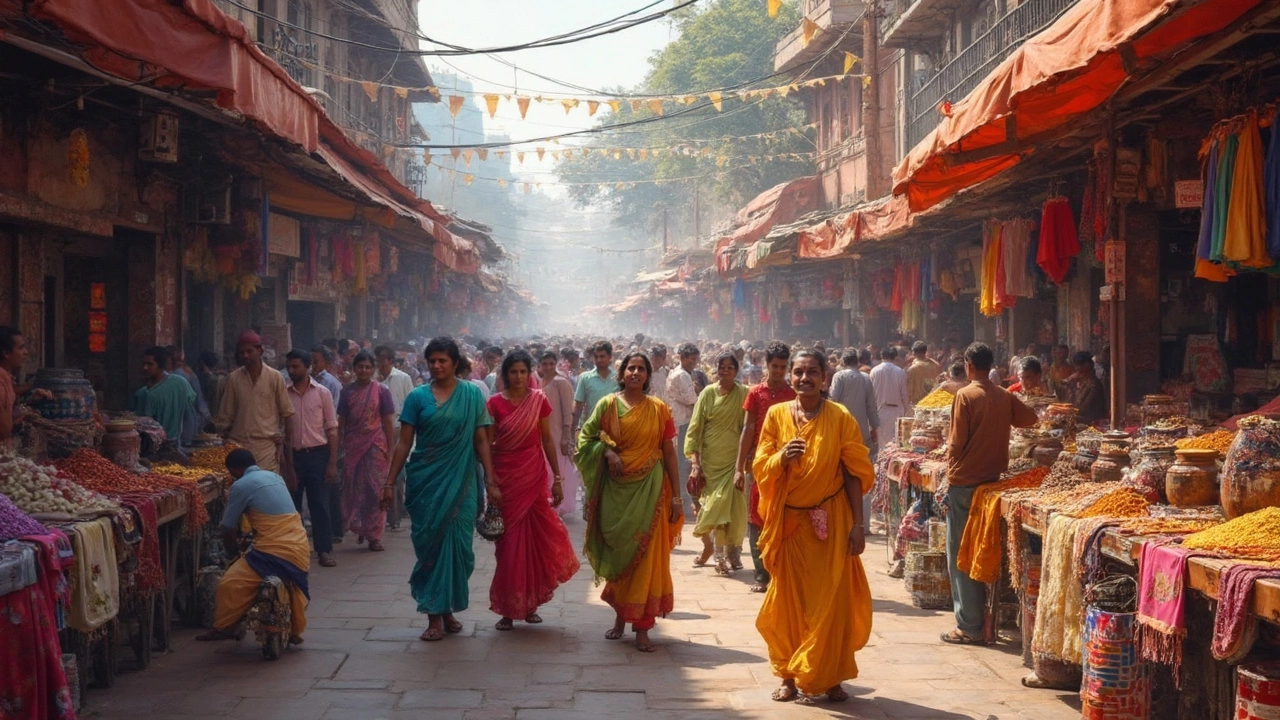If you've ever wondered if India is the right place to plant your roots, you're not alone. The country is massive, not just in terms of land but in the diversity of lifestyle experiences it offers. You've got places where skyscrapers kiss the clouds and street vendors sell $1 meals, right next to each other. This contrast might seem overwhelming at first, but it’s what gives India its unique charm.
First off, the culture here is a melting pot of languages, religions, and customs. Wherever you go, expect to be greeted with different traditions and celebrations. For someone new, it might be a colorful chaos to dive into, but it’s also what makes life here incredibly vibrant and less monotonous. Be open to trying new foods, participating in festivals, and learning even a bit of the local language to blend in better.
- Cultural Diversity and Tolerance
- Cost of Living and Economic Opportunities
- Healthcare and Education
- Community and Lifestyle
Cultural Diversity and Tolerance
One of the most fascinating aspects of living in India is its incredible diversity. With 22 officially recognized languages and hundreds of dialects spoken across the country, it’s a place where linguistic diversity is celebrated daily. You might find it amusing and heartwarming to hear a Kashmiri speak fluently with a Mumbaikar, each in their native language, yet understanding one another perfectly.
Religion also plays a big part in life here, with Hinduism, Islam, Christianity, Sikhism, Buddhism, and Jainism coexisting mostly peacefully. Each religious community brings its own festivals, food, music, and art to the cultural landscape. Cities like Hyderabad, for example, might see Diwali and Eid celebrations happening in harmony side by side, showcasing the spirit of togetherness despite differences.
Now, let's talk a bit about tolerance. While diversity is a hallmark, living in such a mixed environment requires understanding and patience. Common courtesy and respect go a long way here. Indians generally value hospitality, so expect warm welcomes into homes and communities once you are accepted as a part of the local fabric.
Being open-minded and willing to learn from others' perspectives will enrich your experience. In areas like Bangalore or Pune, the expat community has adapted well by engaging with local culture, often joining Indian households for festivities and learning new customs.
- Tip: Attend local events and gatherings, which is a great way to immerse yourself in the culture and meet people.
- Tip: Be curious and ask questions about traditions or practices you don't understand. Locals usually appreciate the interest.
Overall, living in India offers you a chance to embrace differences in a deeply meaningful way, while also expanding your own cultural horizons.
Cost of Living and Economic Opportunities
When it comes to the cost of living in India, there’s a wide spectrum depending on where you decide to settle. Major cities like Mumbai and Delhi are known for their bustling urban life, but they come with a hefty price tag, especially in terms of rent and dining. However, if you're smart about choosing the right neighborhood, you can still find affordable options.
On the other hand, living in smaller towns or rural areas significantly reduces your expenses. Groceries, local markets, and public transportation are generally cheaper, offering a comfortable yet pocket-friendly lifestyle. The affordability factor in India is a big draw for expats wanting to experience a different culture without burning through their savings.
Thinking about economic opportunities? India might surprise you. The country has a diverse job market, particularly booming in the IT and engineering sectors. Cities like Bengaluru and Hyderabad are tech hubs where you can find plentiful job opportunities. The startup culture is thriving too, making it a great place for entrepreneurs.
Here's a little breakdown of costs you might encounter monthly:
- Rent (1-bedroom apartment in city center): Approximately $300 - $600
- Monthly public transport pass: Around $10 - $15
- Meal in a mid-range restaurant for two: About $20 - $25
- Internet: Roughly $10 - $20
While salaries might not match Western standards, the comparatively lower cost of living often makes up for it. Industries like education, pharmaceuticals, and tourism also provide ample employment.
Plus, if you're skilled, especially in tech, engineering, or digital marketing, you'll find lucrative opportunities. Foreign companies are always on the lookout for skilled professionals in these fields. So, if India is on your radar, keep an eye on the sectors booming in different regions to capitalize on the best economic opportunities.

Healthcare and Education
Living in India, you’ll soon realize that both healthcare and education play huge roles in daily life. The country has made strides in quite a few areas, but there's still a lot of ground to cover.
Starting with healthcare, India offers a mix of public and private facilities. While government hospitals are more affordable, often involving little to no fee, they can be crowded and have longer wait times. On the flip side, private healthcare is top-notch and matches international standards, but it’s more expensive. A good tip is to invest in health insurance if you’re planning an extended stay. This can help cushion the costs of the better-quality private facilities.
In recent years, India's push to boost its infrastructure has seen a rise in specialty hospitals and clinics in major cities, making advanced treatment more accessible. For everyday needs, local pharmacies are well stocked, and telemedicine is gaining traction for basic consultations.
Moving to education, it's as diverse as the country itself. India boasts prestigious institutions like the IITs and IIMs, underpinning the living in India with high-caliber education. However, the quality of education at the school level can vary significantly based on location and funding. Urban areas tend to have better resources and facilities compared to rural regions.
The country is home to several international schools, which can be a perfect fit for expats. They follow different curricula such as IB, Cambridge, and others, making the transition smoother for children from abroad. Local schools often follow state or central board patterns, offering education in various languages.
When considering living in India, weigh these aspects to make informed decisions about healthcare and education, prioritizing what best fits your lifestyle and family needs.
Community and Lifestyle
Diving into the community and lifestyle in India, let's talk about the heart of the country—the people. Living in India comes with its set of communal experiences that are both welcoming and sometimes overwhelming. Communities here are typically tight-knit, and everyone seems to know everyone else, especially in smaller towns. This can be comforting as you always have someone to rely on, but it also means privacy can be elusive.
One of the great things about the lifestyle in India is the emphasis on family. Get ready for family dinners, celebrations, and gatherings that happen more often than not. Families tend to live together, sometimes across generations, which can be great for building strong bonds. If you're someone who loves having people around, you'd fit right in.
When it comes to festivals, India doesn’t do anything halfway. Whether it’s Diwali, Holi, Eid, or Christmas, expect your neighborhood to burst into life with lights, colors, and food. Participation isn’t just welcomed; it’s expected.
Now, for a practical look at day-to-day, community amenities vary drastically between living in India's urban centers and rural regions. In metropolitan cities like Mumbai or Bangalore, you'll find gyms, yoga centers, and coffee shops in abundance. But head to a rural area, and it might be more traditional with markets and fields taking the center stage.
| City | Commute Time (average) | Monthly Living Cost |
|---|---|---|
| Mumbai | 45 minutes | $600 (for a bachelor) |
| Delhi | 40 minutes | $550 |
| Bangalore | 35 minutes | $500 |
Whether you're drawn to the hustle of city life or the quiet of a village, India's lifestyle has something to offer. Just remember, in this vast and varied landscape, embracing change and being open to new experiences is key.
